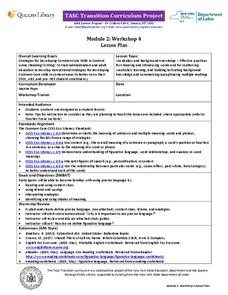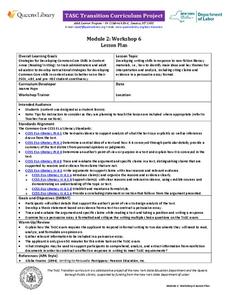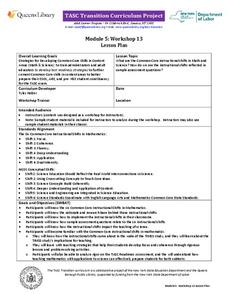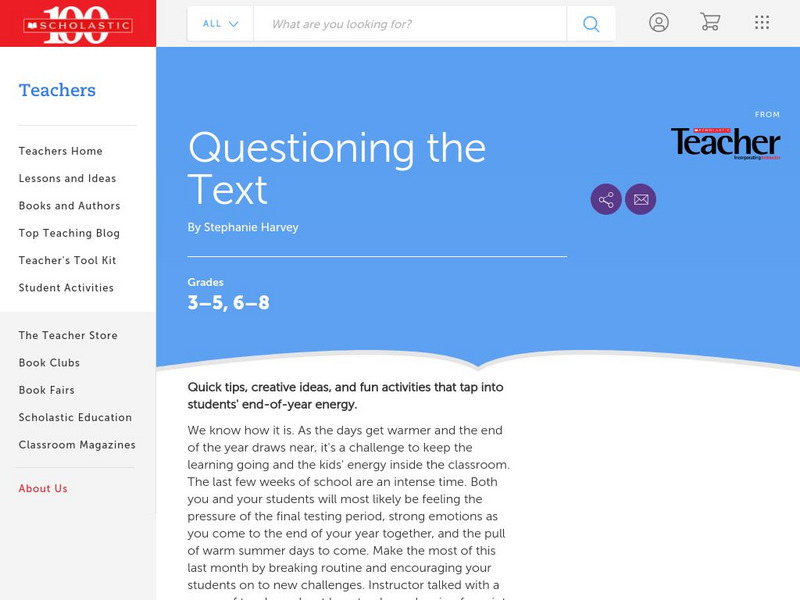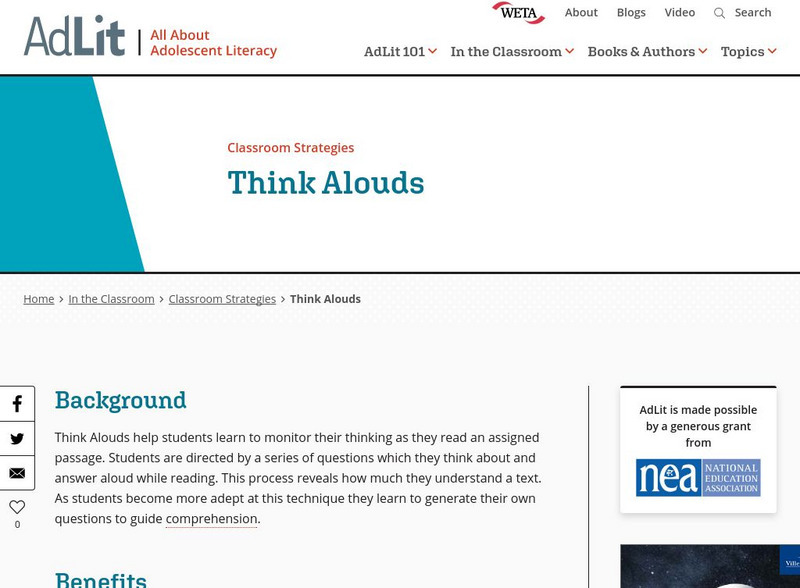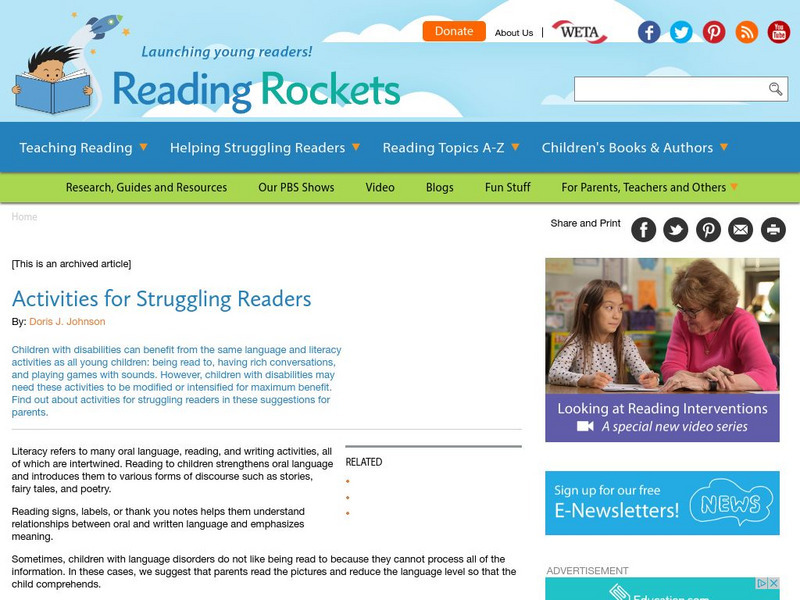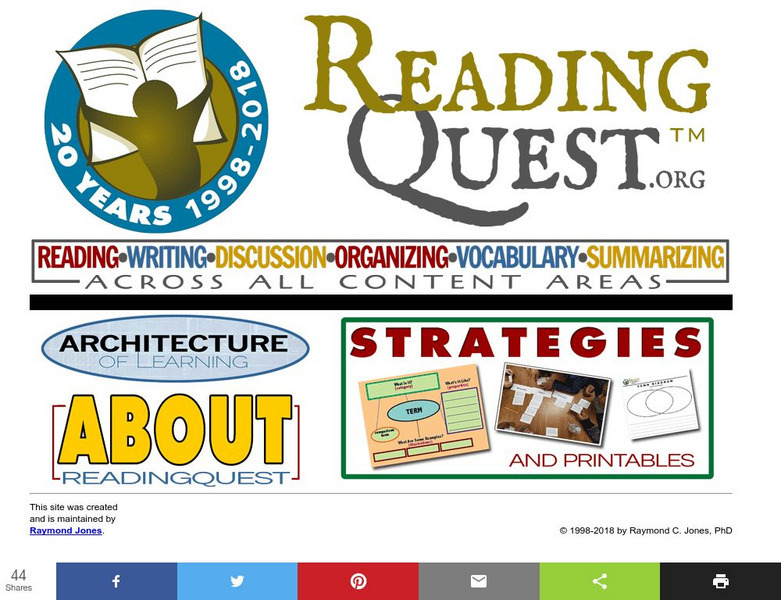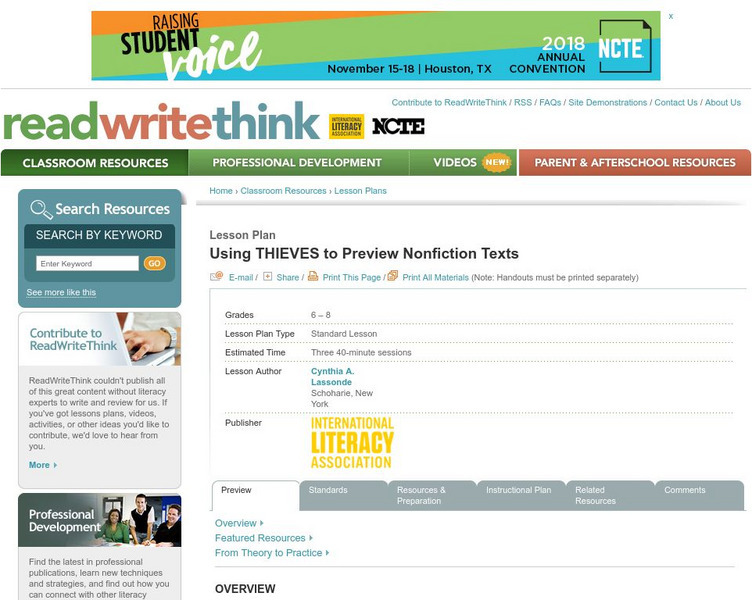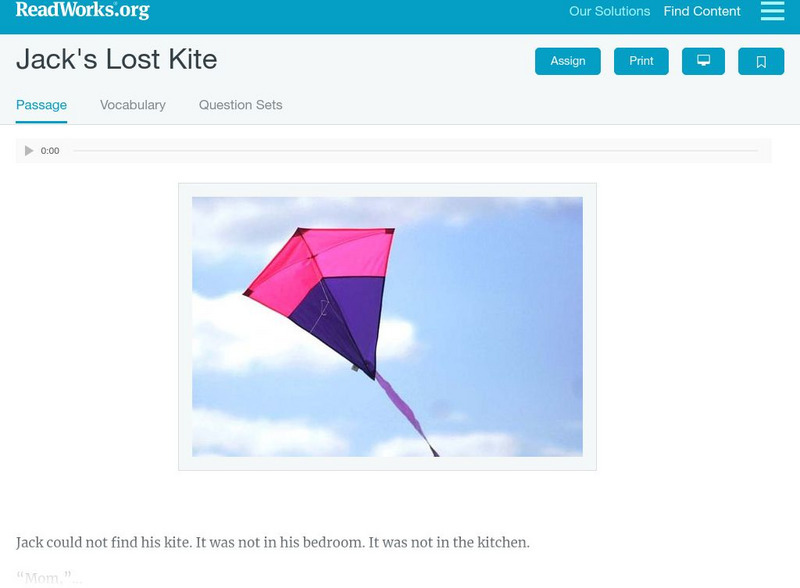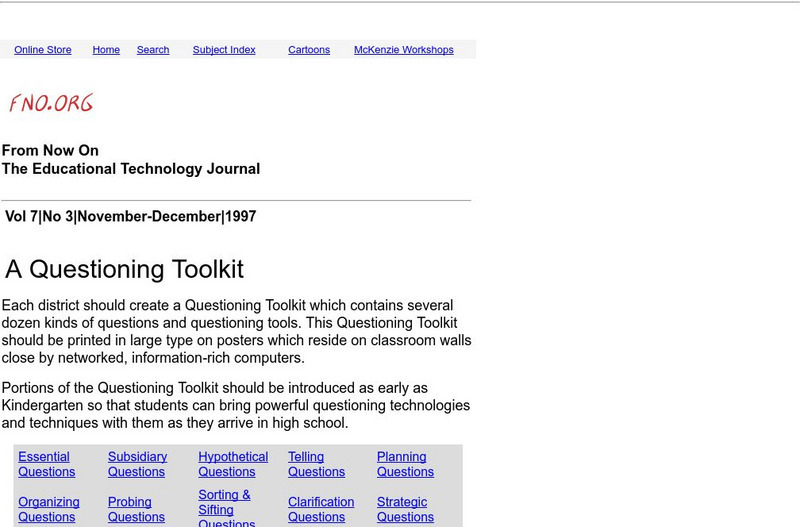EngageNY
TASC Transition Curriculum: Workshop 12
How can opinions slant facts? Workshop participants learn how to examine primary and secondary sources and identify the author's point of view. They also examine how visual art impacts the meaning and rhetoric of sources. Full of...
New York State Education Department
TASC Transition Curriculum: Workshop 4
Why is it important to use precise language? Participants explore this question in the fourth activity in a series of 15 on effective instruction. Perfect for all content areas, the activity promotes appropriate language choice through...
New York State Education Department
TASC Transition Curriculum: Workshop 10
How have educational standards evolved? Educators of adults examine expectations in the 10th workshop out of 15 to better determine how standards have grown. Participants respond to a variety of sample questions to determine how they...
New York State Education Department
TASC Transition Curriculum: Workshop 5
Are video games sports? Pupils investigate this question as well as various nonfiction selections to learn more about claims and the support that defines them. All of the selections mimic the rigor on state tests and encourage close...
EngageNY
TASC Transition Curriculum: Workshop 6
Is a college education necessary for success in today's world? The class investigates the question, along with others at the end of the sixth workshop in a 15-part series. The instructional activity has four parts with multiple...
New York State Education Department
TASC Transition Curriculum: Workshop 13
The six instructional shifts in this workshop definitely move math and science teachers' understanding of instruction. The workshop, 13th out of a series of 15, asks participants to examine sample tests and to look at how the six...
ReadWriteThink
Read Write Think: Using Comprehension Strategies With Elie Wiesel's Night
Working in small groups, students read and discuss Elie Wiesel's memoir Night and then take turns assuming the "teacher" role, as the class works with four different comprehension strategies.RI.11-12.4 Word meaning, RI.11-12.10b Text...
Michigan State University
Michigan State University: Intervention for Reading: Summarization Strategy
Improve understanding of expository materials by summarizing the main ideas. The summarization strategy helps students recall the main ideas and specific facts of materials they read. There are five rules for writing summaries.
Reading Rockets
Reading Rockets: "Seven Strategies to Teach Text Comprehension" by c.r. Adler
In this article, "comprehension strategies" are explained. Supported by research, these strategies are divided into seven different steps, including the following: monitoring comprehension, metacognition, graphic and semantic organizers,...
ReadWriteThink
Read Write Think: Questioning a Comprehension Strategy for Small Group Reading
Contains plans for three lessons about asking the right questions while reading. After the teacher explains the difference between factual and inferential questions, students practice using them in small-group guided reading. In addition...
Hopelink
Hopelink: Reading Lesson Idea: Qar a Reading Comprehension Strategy
Brush up on your reading comprehension skills when you check out this website. It looks at a particular strategy called QAR. QAR stands for "Question-Answer Relationships." This particular strategy helps students learn to answer reading...
Scholastic
Scholastic: Questioning the Text
In this magazine article originally featured in Instructor, the reading strategy called "questioning the text" is explained by the renowned literacy consultant and staff developer, Stephanie Harvey. The steps included for questioning the...
AdLit
Ad lit.org: Classroom Strategies: Think Alouds
Think Alouds help students learn to monitor their thinking as they read an assigned passage. Students are directed by a series of questions which they think about and answer aloud while reading. This process reveals how much they...
Reading Rockets
Reading Rockets: Activities for Struggling Readers
How can you help the struggling readers in your classroom? This site offers some insight into activities to help develop your students reading skills.
ReadWriteThink
Read Write Think: Qa Rs to Develop Comprehension & Reflective Reading Habits
Contains plans for three lessons that use the QAR strategy to develop reading comprehension and reflective reading within learners. In addition to objectives and standards, this instructional plan contains links to sites used in the...
Other
Reading Quest: Making Sense of Social Studies
Teaching students to read well in areas other than language arts requires teaching and reinforcing the kinds of reading strategies taught here. There are 27 strategies, ranging from brainstorming to word mapping. The site includes PDF...
ReadWriteThink
Read Write Think: Using Thieves to Preview Nonfiction Texts
Contains plans for three lessons that introduce a nonfiction prereading strategy with the acronym THIEVES, which stands for Title, Headings, Introduction, Every first sentence, Visuals and vocabulary, End Questions, and Summary. In...
Read Works
Read Works: Passages: Paired Text: "The Treasure Map"
[Free Registration/Login Required] This paired text focuses on the theme of Discovery; it includes two reading passages, "Jack's Lost Kite" and "The Treasure Map," comprehension questions for each passage, and a combined set of questions...
Free Reading
Free Reading: Guess What I'm Thinking?: Initial Sound Accuracy
A version of the "20 Questions" game. The instructor tells the class he is thinking of something that starts with, for example, /b/. The students have to come up with what the teacher is thinking of.
Annenberg Foundation
Annenberg Learner: Workshops: Teaching Reading 3 5
This instructional workshop provides eight sessions on teaching reading in intermediate classrooms: "Creating Contexts for Learning," "Fluency and Word Study," "Building Comprehension," "Writing," "New Literacies of the Internet,"...
FNO Press
From Now On: A Questioning Toolkit
What exactly is a "questioning tool kit"? This resource provides techniques for asking essential questions, hypothetical questions, telling questions, planning questions and organizing questions.
Texas Education Agency
Texas Gateway: Asking and Answering Questions Professional Development
Asking and Answering Questions Professional Development provides strategies to teach students how to ask and answer questions more effectively to improve comprehension in the classroom and on standardized assessments. It containing 9...
Michigan State University
Michigan State University: Interventions for Reading Strategies: Qar Strategy
This Michigan State University site suggests three question-answer relationships strategies, rather than four, leaving out "author and you." Includes examples of each relationship, steps for teaching, and assessment.
Other
Reading Educator: Question Answer Relationships
Based on the presumption that every teacher shares responsibility for teaching reading, this page offers a brief look at question-answer relationships, as well as suggestions for putting the strategy to use in the classroom.

